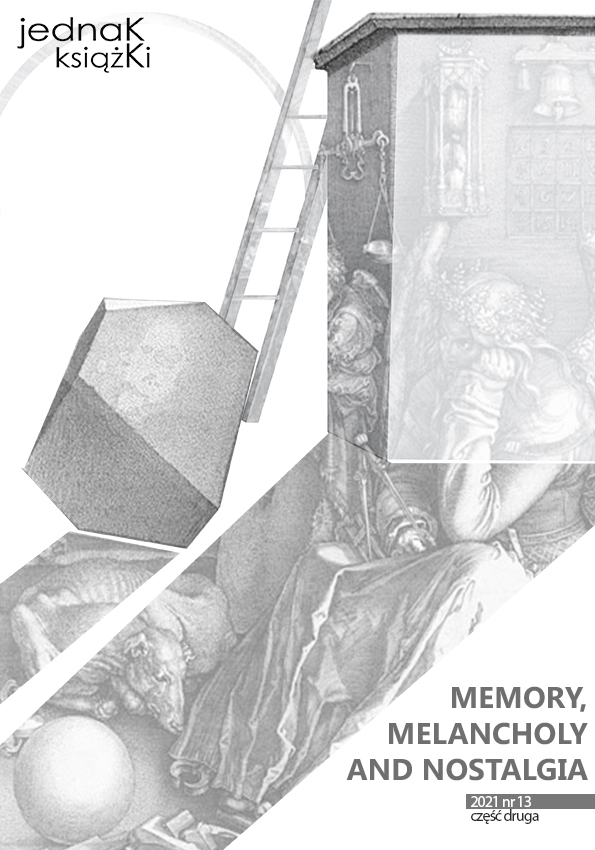Autobiographical Remembering: Memory as Resistance in Bengali Dalit Women’s Narratives
DOI:
https://doi.org/10.26881/jk.2021.13.01%20Słowa kluczowe:
memory, resistance, Bengali Dalit Women, healing, partitioned BengalAbstrakt
This paper makes an attempt to explore how the concept of memory works as a tool of resistance in the narratives of the Bengali Dalit women writers in the Partitioned Bengal. The Bengali Dalit women have been marginalized in different ways, and the history of these women has been neglected. But the atma-katha (life-story) of the Bengali Dalit women seeks to question the accepted official historical record of Bengal. In this paper, I propose to examine the narratives of Dr. Puspa Bairagya and Kalyani Thakur Charal which were chiefly produced in the twenty-first century Bengal and were anti-caste narratives and thereby provide an insight into the counter-memories of the Bengali Dalit women. I would like to apply the autobiographical memory theory to the narratives of these writers. My prospective paper endeavors to illuminate personal agency and healing and would hope to generate a new understanding of the texts in the Indian context.
Downloads
Bibliografia
Acharya Swasti. 2017. “Ami Keno Charal Likhi – Kalyani Thakur Charal.” Neer Ritupatra 18: 151–152.
Bairagya Birat. 2020. MATUA SAHITYA PARIKRAMA. Kolkata: Bibhuti Printing Works.
Bairagya Birat. 2020. MATUA JIBANI SAHITYER ITIHAS. Kolkata: Bibhuti Printing Works.
Bairagya Birat. 2021. MATUA JIBANI SAHITYER ITIHAS. Kolkata: Bibhuti Printing Works.
Bairagya Puspa. 2017. “Chinnomul Doridro Dalit Poribarer Meyer Bere Otha.” Neer Ritupatra 18: 44–61.
Bairagya Puspa. 2020. Interview. By Mondal Purbasha. Bairagya Puspa, Biswas Gopal, eds. 2001. “Matua Dharme Nari.” Surya 3: 83–92.
Bala Manju. 2020. “Barred.” In: Charal Kalyani Thakur, Dasgupta Sayantan, eds. Dalit Lekhika: Women’s Writings from Bengal, 125–126. Kolkata: STREE.
Biswas Atul Krishna. 1992. “Requiem for a tribal girl.” THE HINDUSTAN TIMES, November 29.
Biswas Atul Krishna. 2019. “Saraswati Karketta: Latest Victim of Caste Slur and Harassment in Rabindra Bharati University, Calcutta.” Online: https://www.mainstreamweekly. net/article8913.html. Accessed August 19, 2021.
Biswas Atul Krishna. 2021. Namasudra Itihas Charchar Bhumika. In: Thakur Kapil Krishna, ed. Banglar Namasudra, 17–83. Kolkata: Bibhuti Printing Works.
Biswas Asit , Sarkar Shubh Brat, eds. 2019. Dalit Poems, Songs and Dialogues from Bengal in English Translation. Kolkata: Ababil Books.
Caruth Cathy. 1996. Unclaimed Experience: Trauma, Narrative, and History. Baltimore: Johns Hopkins University Press.
Charal Kalyani Thakur. 2016. Ami Keno Charal Likhi. Kolkata: Bibhuti Printing Works.
Charal Kalyani Thakur. 2019. “MIDDAY MEAL COOK.” In: Biswas Asit, Sarkar Shubh Brat, eds. Dalit Poems, Songs and Dialogues from Bengal in English Translation, 113.
Das Abhisek, trans. Kolkata: Ababil Books. Charal Kalyani Thakur. 2019. “THE POEM OF THE DOWNTRODDEN.” In: Biswas Asit, Sarkar Shubh Brat, eds. Dalit Poems, Songs and Dialogues from Bengal in English Translation, 115–116.
Mondal Sudipta, trans. Kolkata: Ababil Books. Charal Kalyani Thakur. 2019. “THE CASTE WITHOUT A KING.” In: Biswas Asit, Sarkar Shubh Brat, eds. Dalit Poems, Songs and Dialogues from Bengal in English Translation, 119.
Sarkar Shubh Brat, trans. Kolkata: Ababil Books.
Charal Kalyani Thakur. 2019. “AUNT BASINI, THE JHUMUR DANCER.” In: Biswas Asit, Sarkar Shubh Brat, eds. Dalit Poems, Songs and Dialogues from Bengal in English Translation, 120.
Biswas Sravani, trans. Kolkata: Ababil Books. Charal Kalyani Thakur, Dasgupta Sayantan, eds. 2020. Dalit Lekhika: Women’s Writings from Bengal. Kolkata: STREE.
Charal Kalyani Thakur. 2020. “The Opportunists Steal Your Thunder.” In: Charal Kalyani Thakur, Dasgupta Sayantan, eds. Dalit Lekhika: Women’s Writings from Bengal, 133–135.
Chowdhury Srishti Dutta, trans. Kolkata: STREE. Charal Kalyani Thakur. 2020. “My Childhood.” In: Charal Kalyani Thakur, Dasgupta Sayantan, eds. Dalit Lekhika: Women’s Writings from Bengal, 143–154.
Dastidar Suchetana Ghosh, trans. Kolkata: STREE. Charal Kalyani Thakur. 2021. “Kalyani Thakur ‘Chandal’: Depiction of Dalits’ Struggles is the Beauty of Dalit Literature.” Interview by Kartik Choudhary. Forward Press, March 1.
Choudhary Kartik. 2020. “Review of ‘Chinnomul Doridro Dalit Poribarer Meyer Bere Otha’ by Puspa Bairagya.” Yuba Shakti, October 17.
Das Naresh Chandra. 1996. Lord Harichand and Guruchand. Kolkata: Biswas Printing House.
Erll Astrid. 2011. Memory in Culture. Young Sara B., trans. UK: Palgrave Macmillan Private Limited.
Halbwachs Maurice. 1980. The Collective Memory. Ditter Francis J., Ditter Vida Yazdi, trans. New York: Harper & Row.
Kotal Chuni. 2019. “PROTEST.” In: Biswas Asit, Sarkar Shubh Brat, eds. Dalit Poems, Songs and Dialogues from Bengal in English Translation, 82–83. Kolkata: Ababil Books.
Kumar Raj. 2017. DALIT PERSONAL NARRATIVES: READING CASTE, NATION AND IDENTITY. Hyderabad: Orient Blackswan Private Limited.
Kumar Raj. 2019. DALIT LITERATURE AND CRITICISM. Hyderabad: Orient Blackswan Private Limited.
Nora Pierre. 1989. “Between Memory and History: Les Lieux de Memoire.” Representations 26: 7–24.
Punalekar S.P. 2001. Dalit Literature and Dalit Identity. In: Shah Ghanshyam, ed. Dalit Identity and Politics: CULTURAL SUBORDINATION AND THE DALIT CHALLENGE 2, 214–240. New Delhi: Sage Publications, 2001.
Rothberg Michael. 2000. Traumatic Realism: The Demands of Holocaust Representation. Minneapolis: University of Minnesota Press.
Service Express News. 2020. “Manusmriti Dahan Divas cancelled, Section 144 imposed in Naugaon Bazaar.” The New Indian Express, December 26.

 Uniwersyteckie Czasopisma Naukowe
Uniwersyteckie Czasopisma Naukowe





